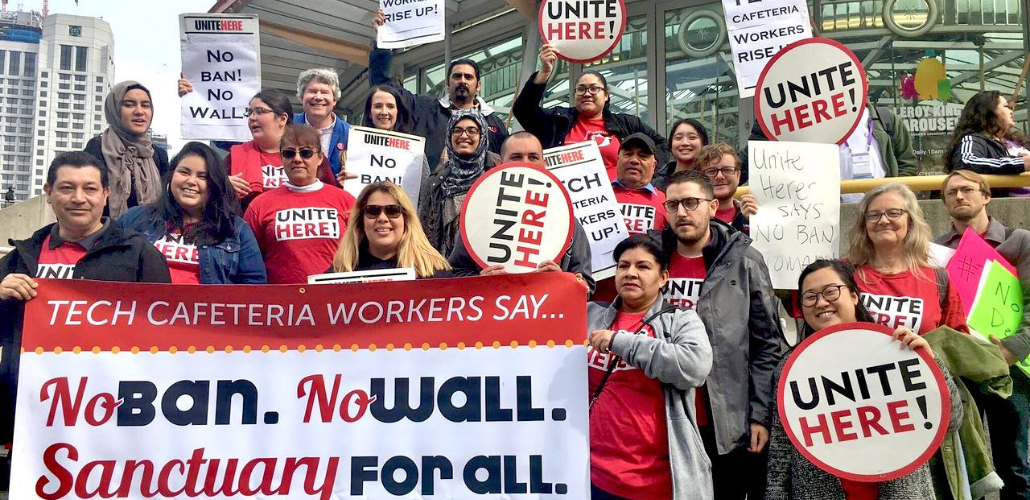Viewpoint: Migration Isn't Going Away. Unions Have to Get Sharper on It.

UNITE HERE members protested Trump's anti-immigrant scapegoating in 2017. Now he's stirring up fear against asylum-seekers once again. Photo: UNITE HERE
The Trump campaign is doing a great job of stirring up anti-immigrant sentiment. Maybe you’re getting an earful from co-workers. Maybe you’re worried yourself.
Sixty-two percent of voters, including two-thirds of white people and even a majority of Latinos, an Axios poll found in June, now say they support what Trump is promising: mass deportations.
Surely far fewer people “would support what it would practically entail,” political scientist Thomas Gift pointed out in Newsweek: “Showing papers on-demand. Racial profiling. A huge increase in the number and scale of ICE raids.”
Still, immigration panic makes an effective wedge issue. President Biden has tacked right, closing the border to asylum-seekers. (Predictably, this attempt to out-Trump Trump has not swayed many voters.)
In some cities, asylum-seekers are already sleeping in tent camps or on church floors. Denied work authorization, they’re forced to find work under the table.
As Auto Workers (UAW) President Shawn Fain said in his speech at this year’s Labor Notes Conference, the billionaires and employers do their best to divide workers over anything they can, including borders.
“They want to villainize some destitute, poverty-stricken person for trying to find a better life,” he said. “They’re not our enemy—they’re our family.”
A CHILLING EFFECT
What’s the impact of immigration policy on non-immigrant workers? We can preach about compassion and solidarity, but people reasonably want to know what it means for them.
If the current labor shortage has given workers more leverage for better wages and confidence to strike, would welcoming more immigrants have the opposite effect?
The answer is no. Immigrants will be here; the question is whether they’re criminalized. Immigrants will work; the question is whether they have any rights at work.
It’s in the interest of employers to keep a layer of workers marginal, available to be hyper-exploited. And it’s in the interest of the whole working class not to let any group be marginalized, because employers will use this situation to ratchet down everyone's working conditions and wages.

SUPPORT LABOR NOTES
BECOME A MONTHLY DONOR
Give $10 a month or more and get our "Fight the Boss, Build the Union" T-shirt.
No wonder the federal government spends 12 times as much to enforce immigration laws as it spends to enforce labor standards, a 2022 Economic Policy Institute analysis found. Imagine if OSHA, the Labor Department, and the NLRB were staffed the way border security is, and management lived in fear of surprise raids to enforce worker rights!
If a dozen people get deported from the workplace across the street from yours, you won’t feel a surge in your leverage with your boss. Quite the opposite—suspicion and division among workers will increase.
And when immigrants get the message to keep their heads down, non-immigrants get the message that they can be replaced or undercut by someone more desperate. Our collective leverage is decreased.
When your employer says, “I have someone else who can do your job for less and won’t complain,” the best-case scenario for you is not that “someone else” gets deported. The best case is that you retort, “Actually ‘someone else’ has joined my union and we are united in our demands.”
SELF-INTERESTED SOLIDARITY
Some migrants, in fact, were already activists in their countries of origin. This is as true now as it has been through U.S. history.
Scratch a landmark labor struggle of the past, and often you’ll find that leading roles were played by immigrants who brought their politics with them—think Eastern European Jews in the garment factories of New York, Finns and Swedes like Joe Hill in the logging camps of the Pacific Northwest, Mexicans and Filipinos in the California fields.
These questions of strategy aren’t new, in other words. Organizers figured out at least a century ago that refusing to allow divisions (tiers are another example!) is the only way to build power. “An injury to one is an injury to all” is very practical.
That’s true whether workers cross the border or employers do. It’s the same logic behind the UAW’s support for independent union organizing in Mexico. As UAW Region 9 Director Brandon Mancilla wrote, “the futures of auto workers in the United States and Mexico are tied together.”
We have to make the self-interested case for solidarity—or we’re going to lose, in workplaces and in the political arena.
Migration isn’t going away. Climate change is making more places unlivable—Bangladesh’s drinking water is full of salt. We live in a country that’s rich and spacious.
I expect migration will be a central issue for the rest of my life. Unions have to get sharp about it.





